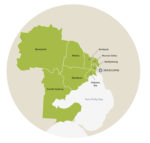Low Carbon West

Councils are taking responsibility to reduce carbon emissions – leading the way by reducing their own emissions and assisting community action. But to transform a whole region to a low carbon economy, councils need to do more. They can collaborate on large-scale projects across municipalities, create opportunities for businesses from sustainable, low-carbon growth, and coordinate programs to increase their reach to communities, strengthen their messages and improve liveability. The Western Alliance for Greenhouse Action (WAGA) is a partnership of eight councils in the west of Melbourne, representing a cross-section from urban (Brimbank, Hobsons Bay, Maribyrnong and Moonee Valley), to growth …




